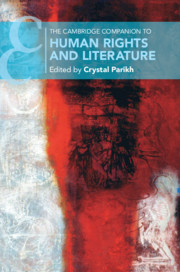Book contents
- The Cambridge Companion to Human Rights and Literature
- The Cambridge Companion to Human Rights and Literature
- Copyright page
- Epigraph
- Contents
- Notes on Contributors
- Chronology of Major Works and Events, 1215–2018
- Introduction
- Part I Genealogies and Contexts
- Part II Fashioning Methods
- Part III Generic Representations
- Part IV Writing Human Rights
- Select Bibliography
- Index
- Cambridge Companions To …
Part III - Generic Representations
Published online by Cambridge University Press: 24 June 2019
- The Cambridge Companion to Human Rights and Literature
- The Cambridge Companion to Human Rights and Literature
- Copyright page
- Epigraph
- Contents
- Notes on Contributors
- Chronology of Major Works and Events, 1215–2018
- Introduction
- Part I Genealogies and Contexts
- Part II Fashioning Methods
- Part III Generic Representations
- Part IV Writing Human Rights
- Select Bibliography
- Index
- Cambridge Companions To …
Summary
This chapter considers how forms of narrative literature, particularly life-writing, serve as technologies in the making of the modern personhood that in turn anchor contemporary human rights. Drawing from Benveniste’s work on the relationship between grammatical personhood and subjectivity, the chapter is structured into “gradations” of personhood, examining their implications on human rights discourse and its subjects. The first-person form common to life-writing, with its centering of the speakerly “I,” operates in the ethical domain of sentiment and empathy; whereas the second-person form of the testimony, with it’s construction of an “I-you,” depends more on a process of interpellation than empathizing. Meanwhile, the third-person form, which may seem less relevant to human rights discourse, provides insight into the ways in which collective bodies, such as corporations, lay claim to human rights. The chapter closes with a reflection on posthumanism and the zero-person or non-human as a potential departure point for probing the limits of the human subject that underlies human rights discourse.
Keywords
- Type
- Chapter
- Information
- The Cambridge Companion to Human Rights and Literature , pp. 127 - 190Publisher: Cambridge University PressPrint publication year: 2019



